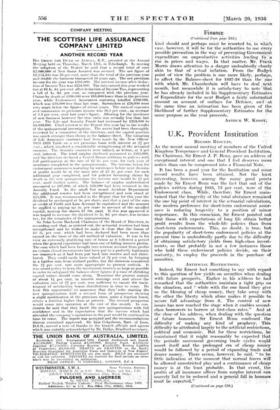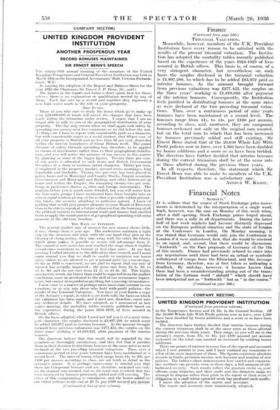. Finance,
(Coiatniyell from page -5554 T kind should and perhaps must- be resorted to, in which case, however, it will be for the authorities to use every possible precaution in the way of preventing Governine, expenditure on unproductive activities leading rise in prices and wages. In that matter, Mr. Frank Morris draws attention to a danger undoubtedly closely akin to that of actual inflation. From the Budget point of view the problem is one more likely, perhaps, to affect the Balance-sheet for 1937-38 than the .one with which Mr. Chamberlain will have to deal nekt month, but meanwhile it is satisfactory to note -'-that he has already included in his 'Supplementary Estimates Of Expenditure for the next Budget a fairly substantial amount on account of outlays for Defence, ancr—at the same time an intimation has been given of the likelihood of further Supplementary Estimates for the same purpose as the year proceeds.
ARTHUR W. KIDD% • •
U.K. Provident Institution
RECORD RESULTS.
AT the recent annual meeting of members of the United Kingdom Temperance and General Provident Instittition, the Chairman, Sir Ernest J. P. Benn, gave an address of exceptional interest and one that I feel deserves more notice than can be compressed into a Financial Note., It has been a good year for the Institution and soliie record results have been attained. Not the lekst interesting, however, among the many good points made by Sir Ernest Benn was the fact that out of the policies written during 1935, 73 per cent. were of the Endowment class. While, therefore, Sir Ernest main- tained that the longevity of the total abstainer remained the one big point of interest in the actuarial calculations, the modem preference for short-term endowment assur- ance is reducing longevity to a position of minor importance. In this connexion, Sir Ernest pointed out that those with expectations of long life obtain better profit results from the whole-life policies than frOin short-term endowments. This, no doubt, is true, 'but the popularity of short-term endowment policies at the present time is undoubtedly partly due to the difficulty of obtaining satisfactory yields from high-class invest- ments, so that probably in not a few instances those who hold these endowment policies decide, on their maturity, to employ the proceeds in the purchase of annuities.
ARTIFICIAL RESTRICTIONS.
Indeed, Sir Ernest had something to say with regard to this question of-low- yields' on securities when dealing with futOre prospeets. Earlier in . his address he had remarked that the authorities maintain -.8 tight grip on the situation,- and .1'.while with. the one -.land they give us the blessing of cheap money, they take away with the other the liberty which alone makes it possible. to secure full advantage from it. The control of new issues has now reached the stage when it enables second- class borrowers to borrow at first-class rates." Arid at the close of his address, when dealing with the question of future bonuses, Sir Ernest Benn confessed: the difficulty of making any kind of prophecy. This difficulty he attributed largely to the artificial restrictions, political and econoinic. But for these restrictions,_ maintained that it might reasonably be expected that the periodic movement governing trade cycles wOvid assert itself and the prolonged era of cheap money would be followed by a period of expanding trade and dearer money. There seems, however, he said, " to'; be little indication at the moment that normal forces will be allowed unrestricted play and a continuance of cheap money is at the least probable. In that event,, the profits of all insurance offices from surplus interest -can scarcely Tail tbi be reduced 'and itieneral fall iw.biiktas0 *must be eitieetedi." _ -
(Continued on page 558.)
. Finance
(Continued from page 556.) TRIENNIAL VALUATION.
Meanwhile, however, members of thel.T.K.- Provident Institution have every reason to be satisfied with the results of the present triennial valuation: The Institu- tion has adopted the mortality .tables recently published based on the experience of the years 1924-1929 of lives assured in British offices. This basis is, of course, of a very stringent character, but nevertheless on, such basis the surplus disclosed in the triennial valuation is £1,897,288, to which has to be added £85,972 paid as interim- bonuses. As the amount brought forward from previous valuations- was £277,455, the surplus opt the 'three years'. working is £1,819,833 after payment of the-- interim' bonuses. Consequently, the Instituticin feels justified in distributing' bonuses at the same rates as were declared at the two preceding triennial valua- tions. Thus, over a continuous period of nine' years bonuses have been maintained at a record level: The bonuses range from 41s. to 45s. per £100 per annum, according to class, and, mortover, they are compound bonuses reckoned not only on the original sum assured. but on the total sum to which that has been increased by bonuses previously added and still existing. Sir Ernest Benn- stated that of the 20.030 Whole Life With Profit policies now in force, over 1,500 have been doubled by bonus additions and a score or so have been trebled. The directors have further decided that interim bonuses during the cutrent triennium shall be at the same rate as those allotted during the previous three years.
In all respects, therefore, the statement which Sir Ernest Benn was able to make to members of the U.K. Provident Institution was a satisfactory one.
ARTHUR W. KIDDY.



































































 Previous page
Previous page